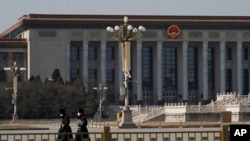China has decided to convene its much-delayed Two Sessions — the annual meetings of the national legislature and the top political advisory body — in late May amid signs that the ruling Communist Party believes it has made strides to contain the COVID-19 outbreak.
Both meetings will be halved to last only one week, with the Chinese People's Political Consultative Conference (CPPCC) opening on May 21, and the National People's Congress (NPC) on May 22, state-run Xinhua News Thursday reported.
It remains unclear if some 3,000 lawmakers and 2,000 political advisers from across the country will attend the meetings in person or virtually.
Convening the meetings sends a political signal that China, the country where the pandemic began, has brought the coronavirus under control, observers say.
Challenges ahead
But challenges remain for the top leadership to address the economic fallout from the global pandemic and growing confrontations with foreign powers, including the United States, observers add.
The meetings will set out programs for the continued containment of the pandemic and its economic and social fallout, Steve Tsang, director of SOAS China Institute at the University of London, said in an email to VOA.
Tsang believes there will not be any political fallout to address since President Xi Jinping will be presented as having triumphed and done well against the public health crisis.
That is because both meetings often work as rubber stamps to endorse the top leadership’s policies and thus leave little room to challenge its authority or for free flow of ideas, said Fan Shih-Ping, a professor of political science at National Taiwan Normal University in Taipei.
Focus on the economy
According to Xinhua News, the Two Sessions will roll out a series of policies and measures to spur development at home and help reactivate the global supply chains and economy.
China will also reconfirm its goal to achieve the building of a moderately prosperous society as slated by 2020, despite the epidemic, Xinhua reported.
The country will further transform external pressure into motivation for deeper reform and opening up and focusing on running China's affairs well, it added.
Drew Thompson, a visiting senior research fellow at Lee Kuan Yew School of Public Policy in Singapore, said the annual meetings are often inward-looking when discussing China’s domestic affairs.
This year, restarting the economy is no doubt the primary focus, in addition to public health issues.
Thompson expects key issues on the agenda will include setting a new economic growth target, down from its previously earmarked 6%; giving a clear guidance of economic priorities; and appropriating resources efficiently without creating any morale hazard while building more infrastructure to improve both consumption and productivity.
He says the goal to build a moderately prosperous society by 2020 will be in doubt and will require adjustments.
Political undercurrents
While the inward-looking meetings provide a venue for Chinese officials to fine-tune their top domestic policies, it is also a time when political undercurrents and key concerns surface, for example, criticism over Xi’s role in China’s initial cover-up of the virus outbreak.
However, as Xi still has firm control of China’s propaganda apparatus, and those who were affected during the outbreak have been marginalized, it looks like “there is no organized opposition to Xi” this year, Thompson said.
“If there’s one weak spot that Xi Jinping has it is that he has not managed foreign relations well. He’s antagonized relationships between China and many other countries, particularly critically important countries. Those relationships have deteriorated, and rivals to Xi Jinping can hold that against him,” he said.
Such criticism is echoed within party circles, but not repeated loudly, Thompson noted.
On top of that, China has often looked at foreign affairs as a secondary priority unless they are for the benefit of improving domestic development, which suggests the Xi administration may not need a strong international relationship, according to Thompson.
Fan, of National Taiwan Normal University, agreed that Xi looks set to continue to tighten his grip, as his rivals inside the party’s top echelon have been weakened and are leaderless. And Xi's firm control of the military helps boost his power.
Desinicization
Fan says the global trend of desinicization is solid and that deteriorating foreign relations will hurt China’s chance of getting international cooperation.
Fan defines the trend as growing anti-China sentiments, a lack of trust in the Communist leadership and negative views toward China’s propaganda campaign.
“I doubt that it will substantially hurt China’s diplomatic relations. But with mutual trust being weakened, there will be limited opportunities for (international) cooperation. Take his One Belt, One Road initiatives as an example. There’s a big challenge ahead, as some African countries may be quitting,” Fan said.
Yuan Nansheng, who formerly served as a Chinese diplomat in India and the United States, warned in an interview with a Beijing-based magazine that the coronavirus pandemic would change the world order and that China, which has enjoyed decades of strategic opportunities, would next experience a certain degree of desinicization.
He said that some Chinese have shown “misguided national pride” in viewing the spread of the virus overseas with a condescending attitude.
Yuan expects the trend of globalization to reverse to a certain degree, further straining U.S.-China relations, although he thinks it is impossible for both economies to decouple.
He also warned that the World Trade Organization, the World Health Organization and other international organizations were likely to weaken and falter, which will allow the U.S. and its allies to establish new global agencies as they distance themselves from China.




